‘Seed of the Sacred Fig’ and ‘All We Imagine as Light’ Head for Possible Historic Cannes Wins: Palme d’Or Contenders Ranked
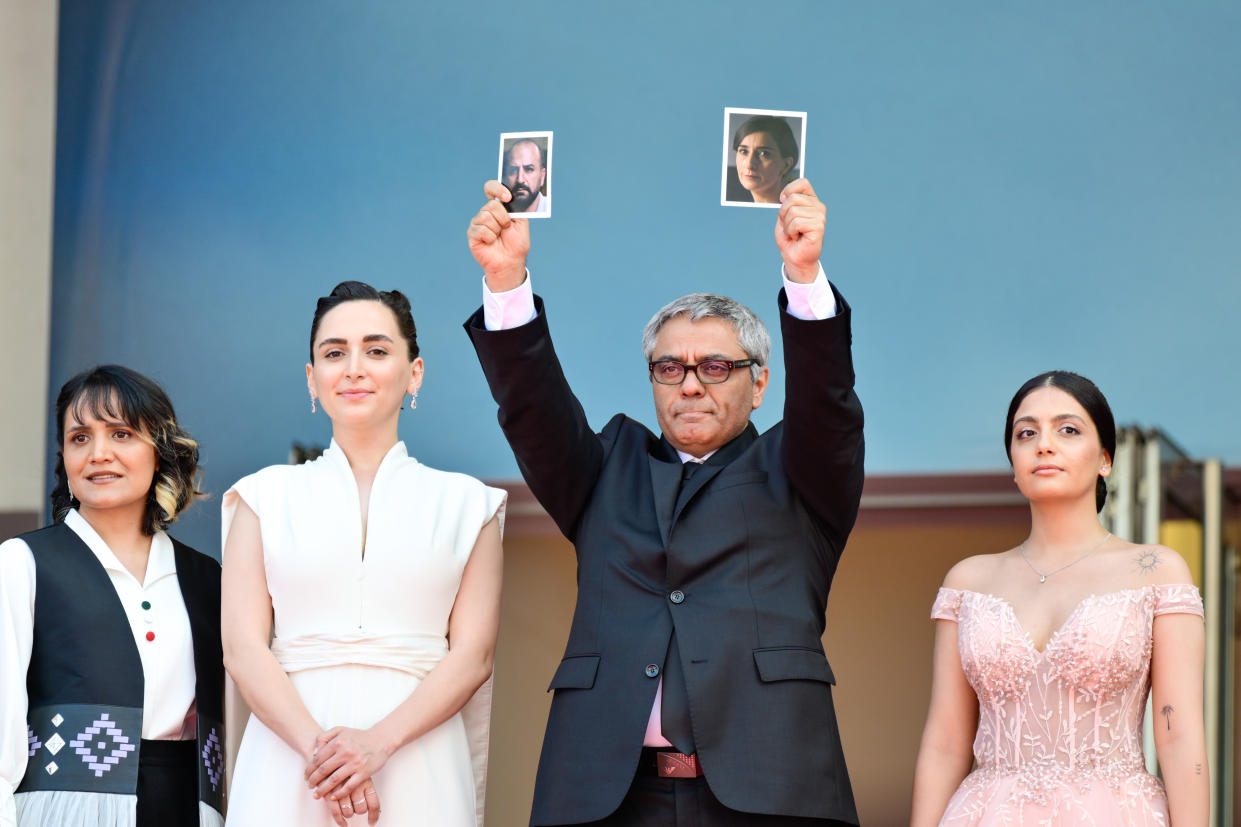
Mohammad Rasoulof’s “The Seed of the Sacred Fig” has a lot going for it on the way to a potential Palme d’Or win: strong reviews, an anguished political call-out against Iranian oppression, and Rasoulof’s own status as an exile who just fled his home country and was finally able to attend Cannes after all. (Read our interview with the director here.)
On the steps of the Palais for Friday’s premiere, Rasoulof held up photos of two of the actors — Misagh Zare and Soheila Golestani – banned from leaving Iran to attend the festival. He’s already shared how the Islamic Republic has been pressuring his crew into convincing Cannes to drop the film, which charts the breakdown of a family after a Revolutionary Court judge’s gun goes missing, from its lineup. This is Rasoulof’s first time in competition. He previously won prizes in Un Certain Regard for “Manuscripts Don’t Burn” (2013) and “Goodbye” (2011), and “Seed of the Sacred Fig” is another movie he had to shoot in secret after his 2020 Berlinale Golden Bear winner “There Is No Evil.”
More from IndieWire
So all of the elements would coalesce — the political timeliness and the undeniable, emotional strength of the film itself — for a worthy Palme or Grand Prix winner. There’s also the fact that Neon acquired the movie mid-festival, surely with the hopes of securing another Palme winner after distributing the last four: “Parasite,” “Titane,” “Triangle of Sadness,” and “Anatomy of a Fall.”
“The Seed of the Sacred Fig” wouldn’t be the first Iranian Palme d’Or winner — Abbas Kiarostami was awarded the honor in 1997 for “Taste of Cherry” — but elevation from the Cannes jury would still send a powerful message. And to a moviegoing world where Iran will in no way ever submit this film for international Oscar contention.
But also earning raves on Thursday was Payal Kapadia’s “All We Imagine as Light,” bought by Sideshow and Janus Films for U.S. release later in the year. The understated drama, about the friendship between two women in Mumbai, is the first Indian film to premiere in the Cannes competition in 30 years since Shaji N. Karun’s “My Own” in 1994. It’s also the first Indian competition film ever to be directed by a woman — and in a 2024 lineup with only four female directors. These factors could also inspire the jury to award “All We Imagine” an historic Palme.
While Jacques Audiard’s trans musical fantasia “Emilia Pérez” was earlier on the top of our charts, now that Netflix has acquired the film, the jury may want to celebrate another film in need of a platform not offered by a global streamer. Netflix has a steady team on the ground, and “Emilia” is the company’s first buy out of the official selection. Still, expect the much-loved film to land a prize elsewhere during Saturday’s ceremony, with Spanish trans actress Karla Sofía Gascón possibly making history in the acting categories.
Cannes competition entries ranked so far by likelihood of winning the Palme d’Or:
1. “The Seed of the Sacred Fig”
2. “All We Imagine as Light”
3. “Anora”
4. “Bird”
5. “The Substance”
6. “Emilia Pérez”
7. “Caught by the Tides”
8. “Kinds of Kindness”
9. “Megalopolis”
10. “Grand Tour”
11. “The Girl with the Needle”
12. “Parthenope”
13. “The Shrouds”
14. “Motel Destino”
15. “Oh, Canada”
16. “Limonov: The Ballad”
17. “Three Kilometers to the End of the World”
18. “Marcello Mio”
19. “The Apprentice”
20. “Wild Diamond”
21. “Beating Hearts”
Wednesday, May 22
A handful of competition premieres just made their way to the Palais to mixed results as the festival starts to wind down, the Cannes Marche du Film shutters Wednesday, and guests pack it up and head home.
In his second time competing for the Palme d’Or after “Red Rocket” three years ago, Sean Baker debuted the spectacularly alive and even exasperating “Anora” (Neon), starring Mikey Madison (“Better Things”) in a breakout, brilliant-from-the-gate lead performance as sex worker Ani. Living paycheck to paycheck in Queens while working as an exotic dancer in Manhattan, she meets a wealthy Russian, Timothée Chalamet-esque Ivan (Mark Eydelshteyn, another auspicious breakout in his first U.S. role). He pays Ani $15,000 to be his “very horny girlfriend” for a week of debauchery in Vegas and in his remote Brooklyn cocaine mansion. They end up getting married impromptu, much to the unhappiness of Ivan’s parents, who make their return to the U.S. from Russia to get the marriage canceled.
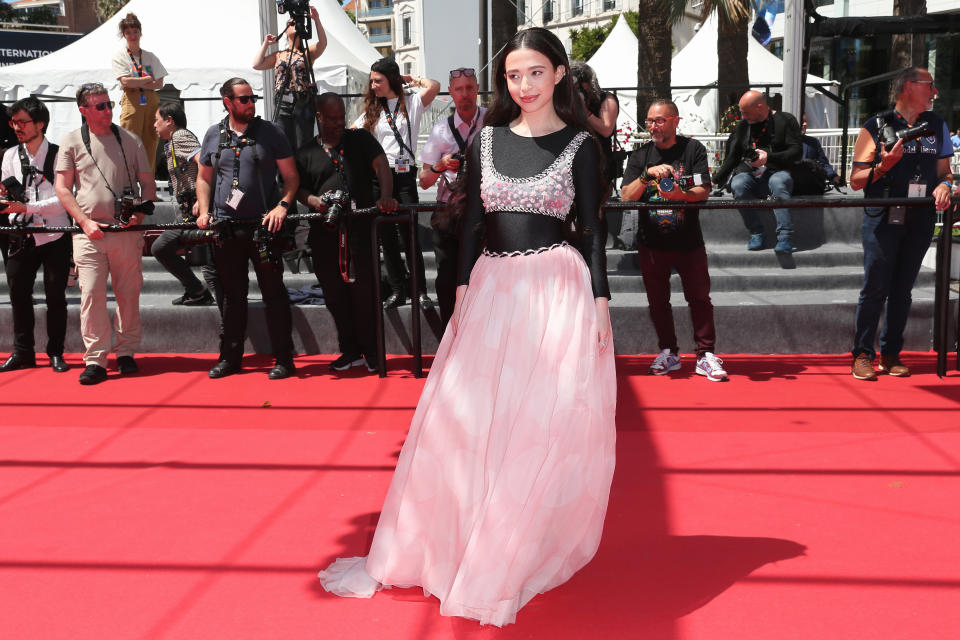
“Anora” goes from freewheeling party movie to “After Hours”-esque chaotic journey into the night as Ani and a pair of thugs go looking for an on-the-lam Ivan. Reviews have been broadly adoring for the “Tangerine” and “Florida Project” director’s latest, with Cannes best actress buzz for Madison. The higher-brow corners of the jury may not find the film serious enough — “Anora” is a lot of fun, until it’s gut-wrenchingly sad in its final moments — but Neon can make this a hit with audiences stateside in the fall. Baker works with the company for the first time after a string of films with A24. Also, in a competition lineup brimming with often stuffy, challenging art films, that “Anora” is an entertaining picture that moves ferociously along will count for something among jurors.
Not getting any buzz or love, really, at all was Ali Abbasi’s who-asked-for-this “The Apprentice,” a villain origin story of Donald Trump (Sebastian Stan) under the tutelage of corrupt New York prosecutor Roy Cohn (Jeremy Strong). The movie is more pale imitation than insightful biographical drama, and with Abbasi’s outsider’s perspective as a Danish-Iranian filmmaker (he directed the 2022 Cannes winner “Holy Spider”), “The Apprentice” feels much like a movie made for European festivalgoers who enjoy laughing at Trump. For the rest of us who’ve spent enough time with him already, “The Apprentice” is a grating sit. But for anyone outside Cannes to see it, this will first need a buyer.
David Cronenberg’s upscale, introspective “The Shrouds” finds the Cannes perennial riffing on the death of his wife, Carolyn Zeifman, in 2017, for a sophisticated rumination on grief, memory, and technology. Vincent Cassel plays a businessman with Cronenberg’s near-exact hairstyle and manner of gait and speech (the actor studied the director’s movements) who develops tech where you can watch your loved ones decay in their graves. This is more a classy sci-fi for smart adults than arthouse horror, though the rare personal touch from Cronenberg could inspire the jury to award his efforts somehow. This is Cronenberg’s seventh Palme d’Or nomination.
Monday, May 21
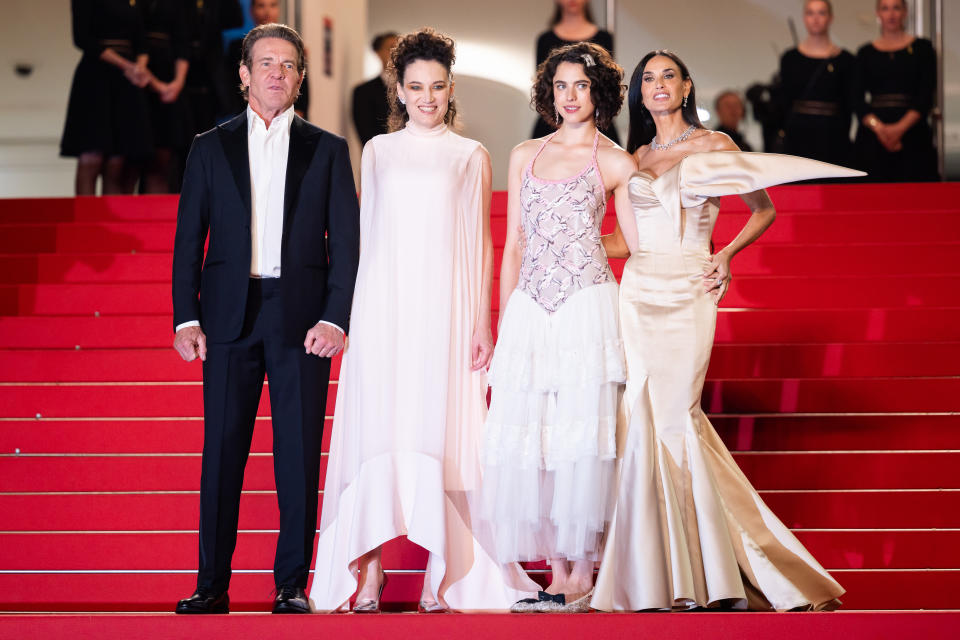
“Emilia Pérez” has some competition on its heels in the Cannes competition: Coralie Fargeat’s body horror feminist industry satire “The Substance” premiered at the Palais last night to ecstatic raves and applause. While I’m not sure another genre film of this one’s gross-out, dare-you-to-lose-your-dinner extremeness can take the Palme d’Or so soon after big winner “Titane” surely paved the way three years ago for “The Substance” to be in the competition at all, this return to form for lead Demi Moore would be a bold choice from the jury.
I’d more expect to see Fargeat in contention for Best Director, as jury president Greta Gerwig might want to support a female filmmaker in a competition lacking in them. There are just four among the 22 films competing for the Palme, and at least one, “Wild Diamond,” feels like Thierry Frémaux’s effort to round that total of women directors up, as debut feature filmmaker Agathe Riedinger’s French coming-of-ager would’ve fared better in Un Certain Regard.
“The Substance” stars Demi Moore as once-beloved actress Elisabeth Sparkle, now resigned to Jane Fonda-esque workout videos in place of a screen acting career, and for whom time has run out. She agrees to an experimental, self-induced medical procedure that produces a “better version” of herself, played by Margaret Qualley not so much as a younger iteration of Moore but as an idealized version of the best self Elisabeth wants to be. Of course, it all goes horrifically, gorily wrong. It’s Moore’s juiciest role perhaps ever, and early responses agree.
Reactions from audiences and press were wildly positive Sunday night, but the film may not land as powerfully with older pockets of the jury. MUBI has distribution rights, which means the film has an edge toward younger, genre-savvy cinephile viewers, and it lacks the forthright emotion of, say, “Emilia Pérez.” Even as “The Substance” morphs from a clinical body horror nightmare into a moving fairytale about the lengths women go to in order to be presentable and loved in a patriarchal world.
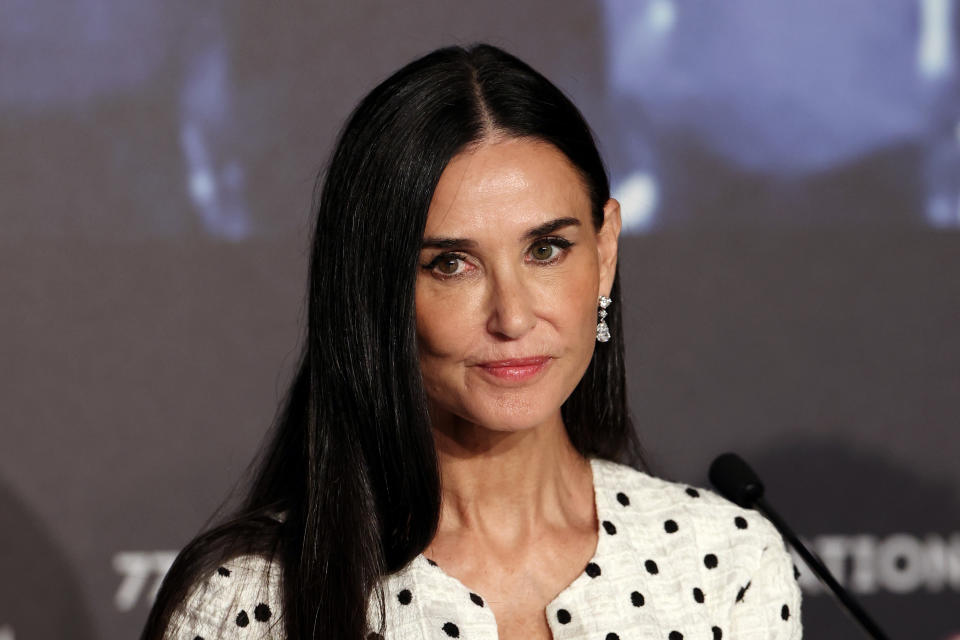
Moore is also an instant Cannes Best Actress contender — though Spanish trans star Karla Sofía Gascón may have that prize locked up for the buzzy “Emilia Pérez” — as she enters what co-star Dennis Quaid said at the press conference is “an incredible third act” of her longtime career. And often in movies that never got awards notices. This is, meanwhile, Fargeat’s second feature and first time at Cannes after her 2017 horror thriller “Revenge” played elsewhere. “The Substance” could be indie distributor, production company, and streaming platform MUBI’s biggest bet yet to take a movie wide and rile up audiences everywhere in theaters.
Also premiering Sunday and perhaps less hot of a ticket was Russian Kirill Serebrennikov’s “Limonov: The Ballad,” starring Ben Whishaw in a career-best performance as the radical poet of the title. Serebrennikov has competed for the Palme three times prior with “Leto,” “Petrov’s Flu,” and “Tchaikovsky’s Wife.” The exuberant biographical odyssey follows Limonov from Moscow to Paris and New York (with 1970s Manhattan fabulously recreated on a soundstage) and back to Russia again, and it’s currently seeking a U.S. buyer. This one feels more like a Best Actor Palme contender for the work of Whishaw, who bares it all physically and psychologically in the British actor’s best leading performance. “Limonov” is Serebrennikov’s English-language debut, and the jury may want to somehow honor a dissident Russian filmmaker who’s spoken out against the war in Ukraine. Politics are ever a factor as much as the movies themselves, even as “Limonov” is more libertine odyssey than political screed.
Sunday, May 20
Saturday saw the premiere of the first bona fide competition hit with “Emilia Pérez,” Jacques Audiard’s queer musical fantasia about a Mexican trans woman’s (breakout star Karla Sofía Gascón) empowerment and liberation.
Audiard, who won the 2015 Palme d’Or from a jury led by the Coens for “Dheepan,” is working in a mode not far-flung from the grit of crime dramas like Grand Prix winner “A Prophet” or 2012 Palme contender “Rust and Bone.” But here, he weds those elements to an emotional story spanning Mexico City and trans identity that’s further outside his comfort zone. Selena Gomez co-stars in this wide-swinging musical as the wife of cartel crime lord Manitas, who with the help of a lawyer played by Zoe Saldana, undergoes gender confirmation surgery. Gascón stars as Pérez in a performance already getting best actress buzz. The movie careens from genre thriller to comedy and musical and queer redemption story, with emotional beats hitting the core of any audience.
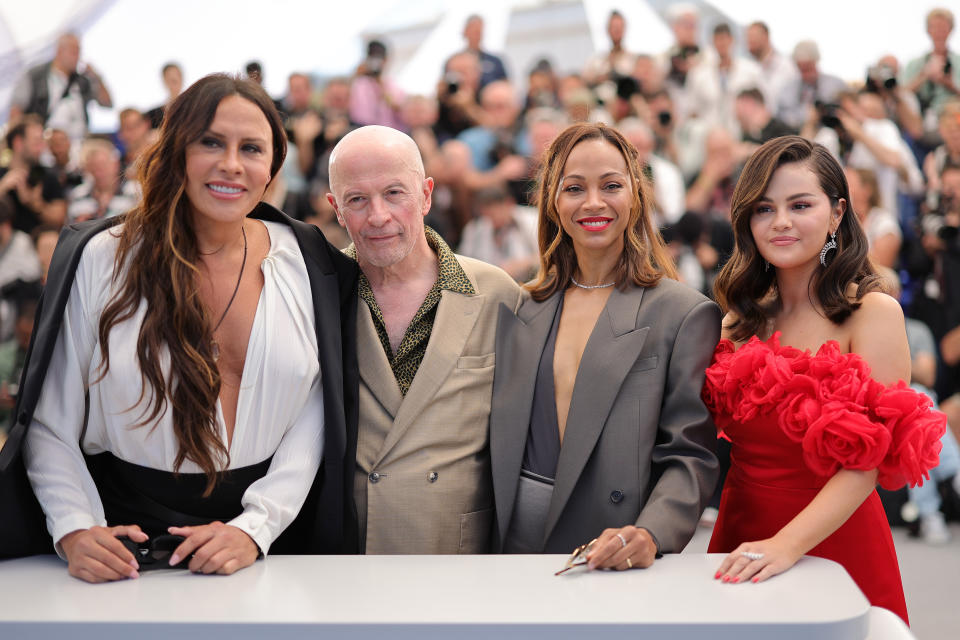
The musical comedy features songs and score by Camille and Clément Ducol with choreography by Damien Jalet (“Suspiria”), all of which wowed audiences in press screenings (where journalists burst into applause at the end credits, a rare occurrence) and earned a nine-minute standing ovation (arbitrary, but still reportedly the biggest so far) at the Palais premiere. Similarly at the press conference, attendees erupted into applause upon the entrance of Karla Sofía Gascón. Though remember the jury is not press. Still, Gerwig’s panel is likely to be just as taken with Audiard’s vision even if IndieWire’s own review wasn’t. “Emilia Pérez” is currently seeking a U.S. buyer but reps from major studios were at screenings throughout the day — Emilia Pérez is definitely the name on everybody’s lips here.
Meanwhile, not quite as buzzy but still likely to appeal to the filmmakers on the jury (including, along with Gerwig, Nadine Labaki, J.A. Bayona, and Hirokazu Kore-eda) is Jia Zhang-ke’s “Caught by the Tides.” Jia’s latest once again stars his wife and longtime collaborator Zhao Tao in a self-reflexive hybrid of documentary and fiction that finds the Chinese fillmaker looking back on 22 years of his career. Jia has already been nominated five times for the Palme, though never winning, and most recently for “Ash Is Purest White” in 2018. Zhao Tao’s performance and praise for the film could support it on the way to some jury prizes.
Coming up on Sunday are Kirill Serebrennikov’s “Limonov,” an exuberant biographical epic starring Ben Whishaw as the title’s Russian writer, and Coralie Fargeat’s body horror Hollywood satire “The Substance.”
Saturday, May 18
Friday at Cannes saw three competition entries make their debut at the Palais: Yorgos Lanthimos’ perverse triptych “Kinds of Kindness,” starring Jesse Plemons, Emma Stone, and Willem Dafoe: Paul Schrader’s “Oh, Canada,” his first competition bow in decades and starring Richard Gere, Jacob Elordi, and Uma Thurman; and Emanuel Parvu’s Romanian drama “Three Kilometers to the End of the World,” added late to the competition.
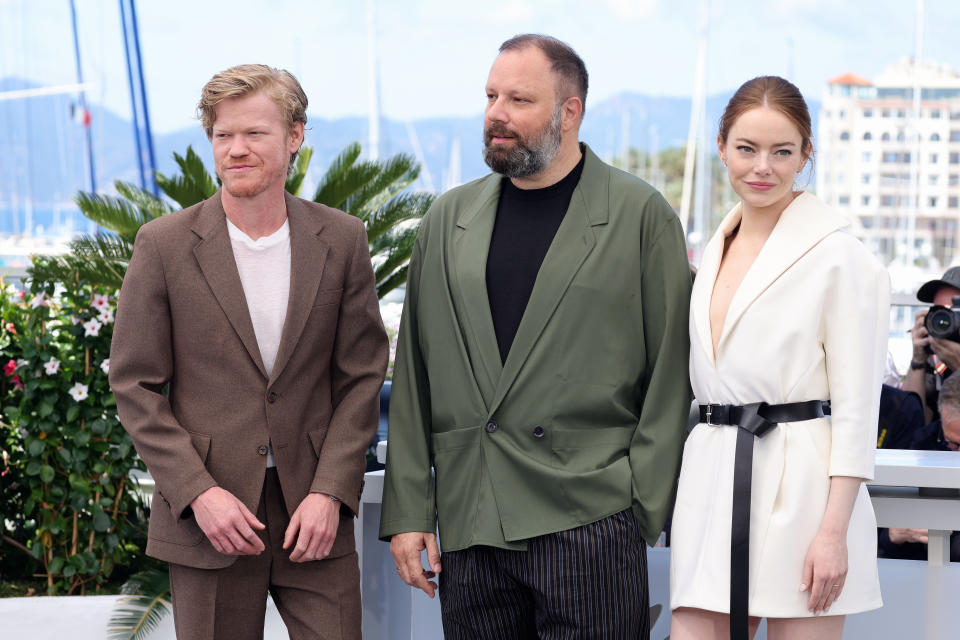
The entire cast came out to a Croisette packed with starry-eyed passersby and ramparts of street security for “Kinds of Kindness,” Lanthimos’ follow-up to “Poor Things,” which he shot in New Orleans while the latter Oscar winner was in post-production. First reactions call the film a dark and twisted return to form for Lanthimos, who is back in “Dogtooth” and “Killing of a Sacred Deer” mode here with his co-writer Efthimis Filippou. Lanthimos has competed or the Palme twice before with “Sacred Deer” and “The Lobster,” winner of the 2015 jury prize under presidents the Coen Brothers and an eventual Best Original Screenplay Oscar nominee. “Kindness” is a divisive movie, dealing in mutilation and dark sexuality as any Lanthimos joint does, that Searchlight will roll out in theaters June 21. It’s certainly the buzziest film to drop in the competition so far in terms of its star power and pedigree, and the jurors could appreciate the film’s daring.
Reviews for Schrader’s “Oh, Canada,” starring Gere as a cancer-addled documentary filmmaker looking back on his life and the younger version of himself played by Elordi, have been mixed to negative. Gere’s performance could get notices from the jury for a possible Best Actor prize; he’s re-teaming with Schrader for the first time since their lurid 1980 breakout “American Gigolo.” Elordi was not in attendance at the Cannes press conference held Saturday morning, though Schrader spoke about a number of new projects, including a psychosexual noir he’s already written, and praised his star Gere.
Meanwhile, there are decent reviews for “Three Kilometers,” which tells the story of how a homophobic attack in a rural Romanian village spurs moral panic among the victim’s parents and neighbors. It’s a more sturdily traditional, old school arthouse competition entry that could come up in discussions for potential jury prizes.
Friday, May 17
What makes for a Cannes Palme d’Or winner? Ignore the critics, because it’s up to the jury, this year led by president Greta Gerwig, to decide.
While far-flung prognosticators might consult the ever-updating Screen Daily international critics’ grid for the writing on the walls, predicting winners is more about assessing the makeup and tastes of the jury. Screening 22 films are filmmakers like J.A. Bayona, Nadine Labaki, and Hirokazu Kore-eda, plus actors like Lily Gladstone, Ebru Ceylan, Eva Green, and Omar Sy. Though past Palme d’Or winners indicate jurors respond to emotion (like “I, Daniel Blake” or “Shoplifters”), more recent winners (“Titane,” “Triangle of Sadness”) have been less typically audience-pleasing. Last year’s Palme d’Or recipient, “Anatomy of a Fall,” was hardly an overwhelmingly emotional movie, but its smart screenplay and great performances took it beyond Cannes all the way to a Best Original Screenplay Oscar win (for director Justine Triet and her partner and co-writer Arthur Harari).
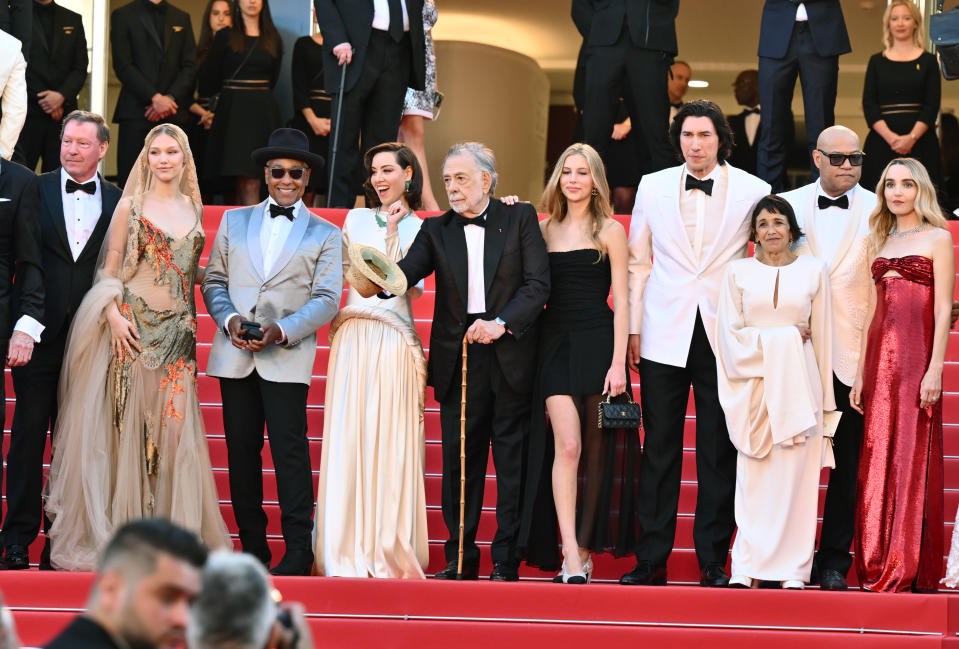
Let’s look at the competition so far. Thursday night saw wildly divergent reactions to Francis Ford Coppola’s self-funded Roman-inspired epic “Megalopolis,” with critics calling it everything from overstuffed to crazily ambitious to catastrophic. An early morning, crack-of-dawn exclusive press screening at the Cineum IMAX theater in Cannes saw journalists pouring out bewildered, while the later press screening elicited the expected boos.
The jury may want to praise Coppola for his four-decade-plus-long efforts in some way, though the visually daring, VFX-heavy $120-million film starring Adam Driver as an architect trying to rebuild a metropolis into a utopia is not an easy embrace (and still lacks a distributor despite IMAX committing to showings). Plus, its female characters, including Nathalie Emmanuel as Driver’s love interest (they have no chemistry) and the daughter of his mayor rival (Giancarlo Esposito), are mostly cartoonish, which may not go over well with Gerwig’s jury. Aubrey Plaza, though, does her best with a boxed-in villain character, the flippant on-camera financial reporter named Wow Platinum who brings her typically daffy comic relief to otherwise unintentionally comic elements. The time-honored Coppola is in the competition for the first time since 1979’s “Apocalypse Now,” another ambitious epic that sharply divided viewers at the time before winning the Palme, and that could work in his favor, too.
More warmly received earlier on Thursday was Andrea Arnold’s “Bird,” starring Barry Keoghan as a father of two living in a squat in northern Kent, and Franz Rogowski as the mysterious vagabond who befriends Keoghan’s 12-year-old daughter (newcomer Nykiya Adams). Arnold has three times won the Cannes jury prize (“Fish Tank,” “American Honey,” and “Red Road”), and the jury may look to elevate her Palme d’Or position at last; “Bird” is a warmhearted crowdpleaser compared to her earlier, darker coming-of-age stories. And all three performances are among the best of the fest so far.
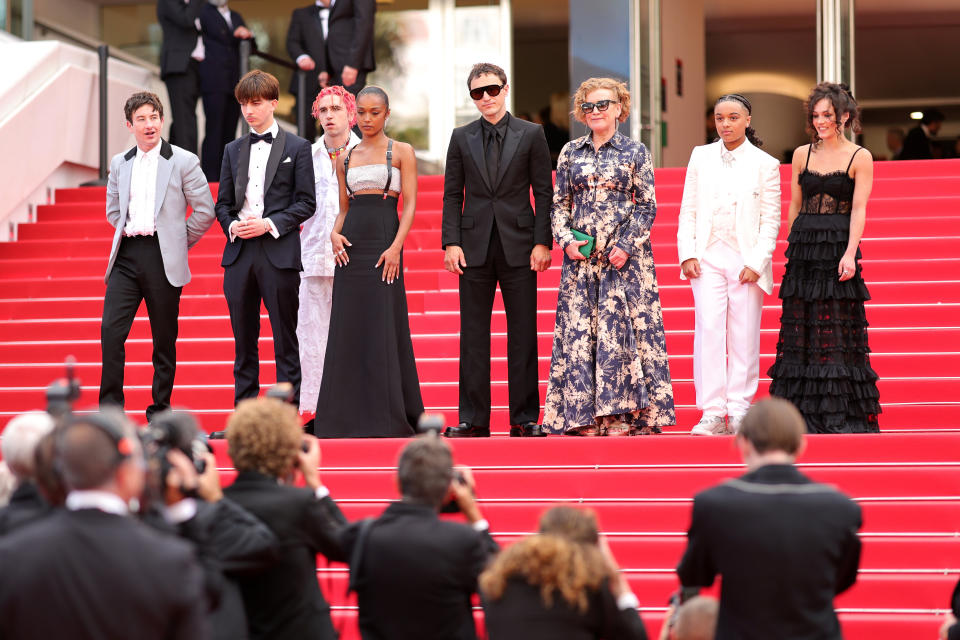
But Cannes audiences were already in a kind of Andrea Arnold mood on day one with the premiere of Agathe Riedinger’s “Wild Diamond,” the only feature debut in competition this year and a late edition from Thierry Frémaux. The Academy ratio-shot French drama follows a hardscrabble teenage girl growing up on the wrong side of the tracks and with dreams of turning her TikTok presence into a reality TV career. The style and substance owe a great deal to Arnold’s “Fish Tank,” but the film, which has received mixed reviews, would’ve fared better in Un Certain Regard. That’s where first and second features tend to premiere anyway, and are eligible for the Camera d’Or.
Earlier in the festival, competition newbie Magnus von Horn, the Swedish director whose debut “The Here After” was up for the Camera d’Or in 2015, entered the fray with “The Girl with the Needle.” Based loosely on the true story of Danish serial killer of infants Dagmar Overbye, the horrifying black-and-white drama hasn’t generated a great deal of buzz on the Croisette so far. But the dark fairy tale’s strong visuals (also in the Academy ratio) and largely female ensemble (Vic Carmen Sonne gives an understated performance as a woman caught under Overbye’s sway) could win over certain corners of the jury for lower-tier prizes.
There’s still much to be seen, with the coming days bringing the premieres of Paul Schrader’s “Oh, Canada” and Yorgos Lanthimos’ “Kinds of Kindness.” Gerwig’s jury, meanwhile, on the day one press conference said it would be impossible not to consider global issues when making their decision. The jury has yet to see Mohammad Rasoulof’s “The Seed of the Sacred Fig,” screening at the end of the festival. But with the director having just fled theocratic Iran following an eight-year prison sentencing, he could be a major factor in the race while in competition for the first time.
Plus, remember that Gerwig is an actress as well as a filmmaker, where prior juries have often been led by behind-the-camera-only auteurs (Ruben ?stlund in 2023, Spike Lee in 2021). Which means an emotional response to a film could dominate over craft, or at least be just as likely a factor. We’ll keep you updated as the competition unfolds.
Additional reporting by Anne Thompson.
Best of IndieWire
Sign up for Indiewire's Newsletter. For the latest news, follow us on Facebook, Twitter, and Instagram.
Solve the daily Crossword

